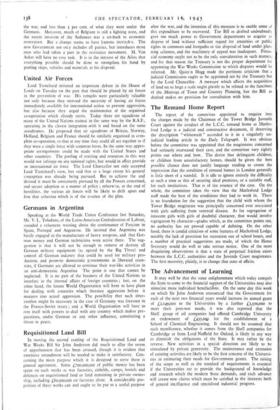The Advancement of Learning
It may well be that the same enlightenment which today compels the State to come to the financial support of the Universities may also stimulate more individual benefactions. On the same day this week on which Sir John Anderson announced that the Government for each of the next two financial years would increase its annual grant of £2,149,000 to the Universities by a further £3,5oo,000 to meet their post-war needs, it was also reported that the Shell group of oil companies had offered Cambridge University an endowment of £435,opp for the establishment of a School of Chemical Engineering. It should not be assumed that such munificence, whether it comes from the Shell companies for Cambridge or from Lord Nuffield for Oxford, is likely in any way to diminish the obligations of the State. It may rather be the reverse. New activities in a special direction are likely to be stimulated by private generosity. The maintenance and extension of existing activities are likely to be the first concern of the Universi- ties in estimating their needs for Government grants. The raising of the scope as well as the standard of requirements is essential if the Universities are to provide the background of knowledge and research which the modern State demands, and each advance will create new claims which must be satisfied in the interests both of general intelligence and specialised industrial progress.


























 Previous page
Previous page